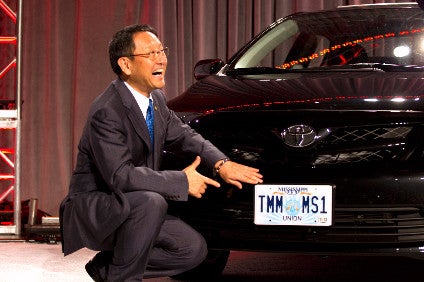
Toyota chairman Akio Toyoda and nine other members of the automaker’s board were re-elected at an annual general meeting on Tuesday with shareholders reportedly shrugging off concerns about governance and certification test scandals.
According to Reuters, two leading proxy advisers had recommended against Toyoda’s re-election but his re-appointment was widely expected given shareholdings in the automaker owned by other Toyota group firms, record business results and his popularity among Japanese retail investors.

Discover B2B Marketing That Performs
Combine business intelligence and editorial excellence to reach engaged professionals across 36 leading media platforms.
Toyoda’s approval rating fell to 85% last year from 96% in 2022, the report said. Since then, the automaker has been hit by a spate of safety and other certification testing violations at group firms including small car maker Daihatsu as well as at its parent company.
Proxy adviser Institutional Shareholder Services (ISS) had taken issue with the way the automaker has dealt with problems, the news agency reported.
New York City’s public employee pension funds, for example, agreed with that stance and voted against Toyoda.
“Setting a tone at the top is critical,” Michael Garland, who oversees corporate governance for the funds, said in a statement emailed to Reuters.
Glass Lewis, which had recommended that Toyoda not be re-elected for a second consecutive year, said he was responsible for the board’s lack of independence and also cited concerns about its strategic shareholdings and return on equity.
Most of any opposition to Toyoda was expected to have come from overseas investors, which account for a quarter of Toyota’s shareholders, Reuters said.
Reuters saud Toyoda, grandson of the company’s founder, remains deeply popular among retail investors, which account for 12.6% of the automaker’s shareholders. Last business year’s record profits and a strong stock performance have also worked in his favour.
Shareholders on Tuesday also rejected an investor proposal urging greater disclosure of climate lobbying that had been opposed by Toyota, Reuters added.




